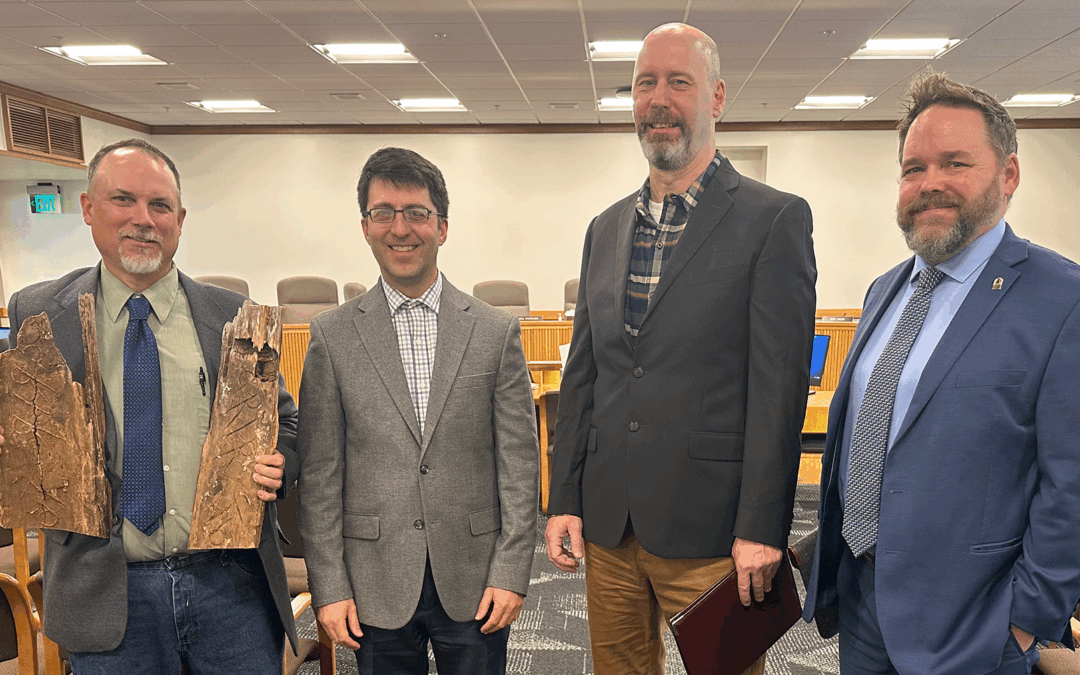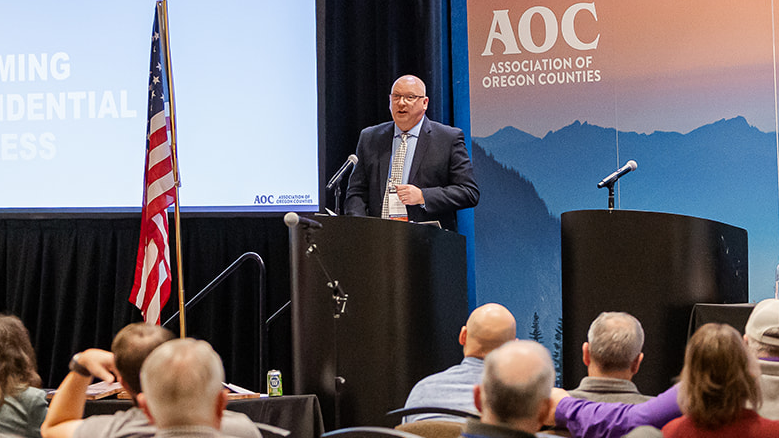
Apr 30, 2025 | AOC Advocacy, AOC News, Transportation
The Co-Chairs of the Joint Committee on Transportation recently released a framework for the 2025 Transportation ReInvestment Package (TRIP). New revenue proposed in the framework equates to a 70% increase in statewide county road department funding over current projections. According to the 2024 County Road Needs Study, counties statewide face a $834 million/year funding shortfall – the TRIP framework makes significant progress toward filling that gap.
The TRIP framework aligns with the Association of Oregon Counties (AOC) Legislative Committee’s transportation priority by maintaining the 30% county share and modernizing State Highway Fund (SHF) revenue mechanisms. The framework also directs 90% of all new revenue to safety, maintenance, and preservation across the shared transportation system.
“Advocacy from counties will be critical to maintaining these proposed investments and the county 30% share of the SHF in the final package,” urged Legislative Affairs Director Mallorie Roberts.
While bill language is expected to be released by early May, with public hearings in the Joint Committee on Transportation to follow, negotiations among legislators are already underway. AOC has prepared talking points (linked below) based on AOC’s transportation package priority and principles which can be used as a starting point to engage with the Legislature and the media.
AOC appreciates your advocacy and engagement in this top priority issue for AOC and counties. Please copy AOC Legislative Affairs Director Mallorie Roberts on emails to legislators, and if you have any questions please don’t hesitate to reach out.
Resources

Apr 30, 2025 | AOC News
Polk County Survey Crew Chief Josh Herzberg, Lincoln County Surveyor Eli Adam, Clatsop County Surveyor Vance Swenson, and Lane County Deputy County Surveyor Trevor Ross (L-R)
House Bill 3175 passed unanimously out of the Senate Committee on Veterans, Emergency Management, and Federal and World Affairs this week. The bill lifts the statutory 40-year-old cap on the document recording fees that go to county surveyors’ Public Land Corner Preservation Funds, and now moves to the Senate floor for a vote, then to the governor’s desk to be signed into law.
Removing the $10 fee cap, which was set in statute in the 1980s, allows boards of county commissioners and county courts to set a document recording fee commensurate to local needs. If passed out of the Senate and signed by the governor, HB 3175 would go into effect on Jan. 1, 2026.
County Public Land Corner Programs are struggling to meet their statutory obligations to maintain public land corners due to the decline of the $10 fee’s value – down 70% since it was set in the 1980s. Modernizing this funding mechanism has been a legislative priority for the Association of Oregon Counties (AOC) and the Oregon Association of County Engineers and Surveyors (OACES) for nearly 20 years, though past attempts to pass legislation have failed.
Oregon county surveyors have been maintaining and perpetuating the Public Land Survey System (PLSS) – critical public infrastructure established by the federal government in 1785 – since statehood. The PLSS consists of controlling property corners located every half mile, forming the foundation for all public and private real property and resource land boundaries in Oregon. Maintaining these corners is an ongoing process requiring physical inspection and establishment or reestablishment of historical corners still set in trees or with rocks. Over time, corners are destroyed and damaged by natural events, development, and careless human activity. When corners are destroyed or improperly placed, every landowner’s property lines become less certain, resulting in costly boundary disputes and litigation, disorderly development, and emergency response challenges.
HB 3175 was introduced by Representative Marsh (D-Ashland) and Representative Gomberg (D-Otis) on behalf of the Association of Oregon Counties (AOC) and the Oregon Association of County Engineers and Surveyors (OACES). OACES members Polk County Survey Crew Chief Josh Herzberg, Lincoln County Surveyor Eli Adam, Clatsop County Surveyor Vance Swenson, Lane County Deputy County Surveyor Trevor Ross, and Wasco County Surveyor Bradley Cross testified in the House and Senate Committees.
Contributed by: by Mallorie Roberts | AOC Legislative Affairs Director

Apr 30, 2025 | AOC News, Health & Human Services
Which communities do you belong to? Who is your closest friend? What are your dreams? Who do you consider family?
These were the questions asked of members of the 2025 County College class during an exercise led by a peer support specialist at the Oregon State Hospital Museum of Mental Health. Participants began with a paper star symbolizing their support systems. As points are removed, the pieces represent how losing support can impact a life. The activity helped the group reflect on the lives of individuals receiving care at the hospital and better understand the importance of community and support systems in mental health treatment.
In addition to this exercise, the class toured the Oregon State Hospital Museum of Mental Health, which explores the history of the hospital since its founding in 1862. The museum shares stories of the patients who lived there and traces the evolution of mental health care over time.
This experience was part of the third session of County College, a program by the Association of Oregon Counties (AOC) designed to equip new county leaders with training on governance, roles, and responsibilities. The session focused on Health and Human Services — a broad and vital area where counties act as the primary link between state programs and local service delivery. As local mental health and public health authorities, counties are responsible for ensuring that public health, behavioral health, and developmental disability services are responsive to the community’s needs and work in coordination with public safety and other local partners.
“Counties have so many critical responsibilities delegated by the state that it is sometimes hard to track them all,” said Washington County Commissioner Jason Snider. “I really appreciated the thorough sessions on public health, behavioral health, and veteran services. Learning about the long and complicated story of the Oregon State Hospital also helped me connect the current challenges we face with the history of how we got here.”
Throughout the session, participants heard from a variety of agencies that partner with counties to deliver these essential services — including OSU Extension Services, the Oregon Health Authority, the Association of Oregon Community Mental Health Programs, and the Oregon Coalition of Local Health Officials. These discussions offered firsthand insights into the collaborative nature of delivering mental and public health services across the state.
Three county commissioners — AOC President and Umatilla County Commissioner John Shafer, Lane County Commissioner Laurie Trieger, and Wasco County Commissioner Phil Brady — shared their experiences in meeting behavioral health needs in their communities, offering lessons learned and success stories.
Veterans services, like health and human services, are delivered through a long-standing state and county partnership. Lincoln County Veteran Services Officer Keith Barnes provided an overview of services and assistance available to all who have served and their families
At the national level, the National Association of Counties (NACo) supports counties in the intergovernmental system. NACo’s Legislative Director Owen Hart discussed how commissioners can influence federal policy and access opportunities and resources. Gregory Nelson, director of the National Center for Public Lands Counties, provided updates on how the center coordinates with federal agencies on key issues like landscape health, wildfire mitigation, and economic development.
The session wrapped up with iSector sharing best practices on convening leaders from the private, public, and civic sectors to address challenging issues, leaving attendees inspired and better prepared to tackle pressing issues in their own counties.
Executive Director Gina Nikkel emphasized the important role of intergovernmental collaboration in addressing behavioral health. “County commissioners are uniquely positioned to act as convenors and problem-solvers within their communities,” she said. “Behavioral health is a complex issue and I’m grateful for this county college class’s commitment to understanding it and their willingness to work to strengthen how we support individuals with mental health needs.”
Special thanks to OSU Extension Services and CIS Oregon for their financial support that helps make County College possible, and to all our guest speakers for sharing their time and expertise on behavioral and public health, veteran services, and building strong partnerships that support healthy individuals, families, and communities.
For more information on County College visit: https://oregoncounties.org/ed-events/#countycollege
Contributed by: Erin Good | Communications Coordinator

Apr 29, 2025 | AOC Business Partner
Sponsored content contributed by AOC Business Partner: Nationwide
In April, Nationwide celebrated National Financial Literacy Month by offering resources to help you spring forward in your financial journey. It’s the perfect opportunity to establish fresh financial habits and grow your financial knowledge.
Whether you are just starting your work career, approaching or living in retirement, there are always ways to improve your financial literacy. National Financial Literacy Month was about helping you improve your financial know-how.
Nationwide and their Supplemental Retirement Plan offer the following tips to help you grow your financial literacy at any age.
College students and early career
- Plant the seeds of savings in your budget
- Cultivate an emergency fund that can cover 6 months of living expenses
- Begin saving for retirement early, and nurture your savings with small increases each year
Midcareer
- Trim your budget as needed to stay on track for your goals
- Evaluate your savings options to determine whether they’re still appropriate for you
- Regularly review your financial goals and track your progress
Nearing retirement
- Start planning a retirement budget that accounts for changes in income and expenses
- Grow an emergency savings fund that can cover 1 to 2 years of expenses
- Log in to your Nationwide Retirement Plan account
- Use My Income & Retirement PlannerSM to help you plan a withdrawal strategy
- Work with your Retirement Specialist to help your retirement plans blossom at no additional charge
Retirees
- Maintain but adjust your budget as needed
- Consider additional income sources, especially in the early retirement years
- Revise your withdrawal strategy as your financial needs change
- Keep tabs on legislative changes that may affect you
- Complete estate planning to ensure your assets are distributed according to your wishes
These are just a few tips that workers and retirees found helpful. Nationwide can help you put together a financial literacy plan that works for you and your family.
Plant the seeds for a prosperous financial future.
For more information and resources visit Nationwide’s Financial Literacy Month webpage.

Apr 29, 2025 | AOC News
During the 2024 Annual Conference, the Association of Oregon Counties (AOC) President John Shafer (Umatilla County) announced his 2025 presidential initiative to focus on behavioral health. Shafer’s presidential initiative kicked off in January with a series of monthly challenges.
June challenge: Coordinated Care Organizations (CCOs) partner with local mental health authorities to ensure that their communities get the most value from their Medicaid and county services. CCOs are responsible for managing Oregon Health Plan (OHP) members’ medical and behavioral health care by maintaining an adequate care network, providing care management, and paying providers for covered services. This month, schedule lunch with your local CCO director(s) to find out what’s top of mind for them and discuss coordination in the year ahead.
Stay tuned for additional learning opportunities throughout the year and a celebration at the 2025 AOC Annual Conference.
###
Previous challenges
January: Read this short primer on local mental health governance in Oregon, authored by Malheur County Community Mental Health Program (CMHP) Director Steve Jensen, and hear a brief presentation by Greater Oregon Behavioral Health (GOBHI) CEO Ann Ford at the AOC Legislative Committee meeting, held on Monday, Jan. 13. (presentation slides)
February: Whether you know your CMHP director well, or will be meeting them for the first time, your February challenge is to invite them to lunch, say ‘thank you,’ and listen. You’ll be glad you did. Our community mental health program directors are among the most dedicated, hardworking public servants in Oregon and a tremendous resource to the local mental health authority — you! Strong relationships are the bedrock of mental wellbeing and of good governance.
March: Tour your community mental health program
There is no substitute for being physically present and able to use all five senses. Make some time with your director this month to walk through your local facilities, meet the staff, and learn more about your program’s current strengths and challenges that you can help champion at AOC, the Local Government Advisory Committee, and with our state and federal partners.
April: Join this year’s County College class virtually on Thursday, April 17, at 4:30 p.m., for a discussion with AOC President and Umatilla County Commissioner John Shafer. Shafer will discuss his presidential initiative, including best practices for prioritizing behavioral health to equip counties to exercise their local mental health authority and foster healthy, vibrant, and safe counties across Oregon.
May: It’s Mental Health Awareness month! Partner with your Community Mental Health Program during the month of May to promote mental health in your county. Engage with your congressional delegation, publish a letter to the editor, or pass a resolution recognizing May as Mental Health Awareness Month. The National Association of Counties (NACo) provides templates for a press release, letter to your members of Congress, social media post and more in their outreach toolkit.





